The Class of 2020 at Georgia Tech's Aerospace Engineering School Reflects on their Past to Grasp the Future
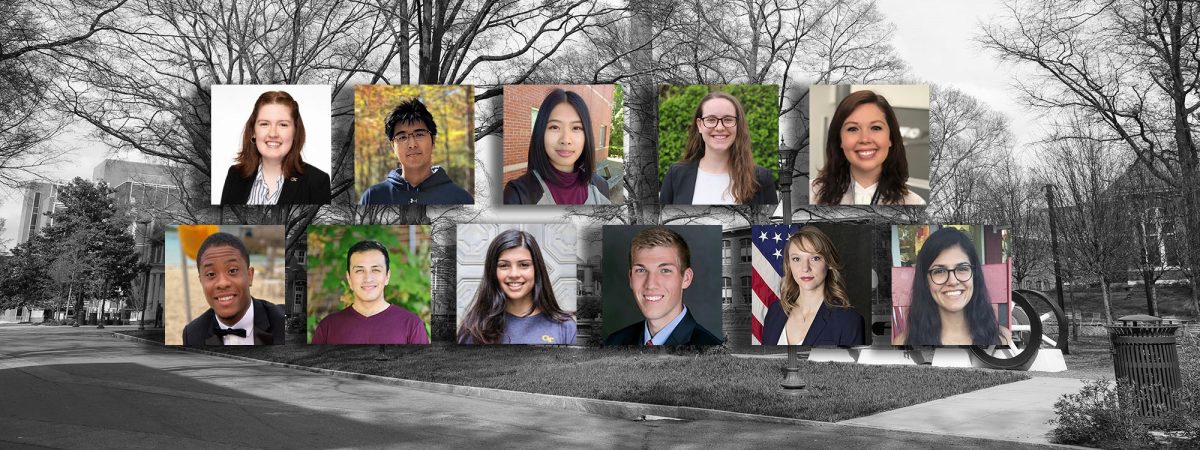
The question we pose to our graduates every semester - What's Next? - takes on new meaning for the Class of 2020, who are finishing this chapter of their education in an environment that is swirling with uncertainty. What we found when we spoke with this year's nominees was a group of individuals who have learned to take life's challenges in stride.
Take our first interviewee, Kerianne Hobbs. Scheduled to defend her dissertation on Friday the 13th of March, she didn't suffer even a hint of paraskevidekatriaphobia. What made Hobbs nervous was getting her committee together for a rigorous review.
"There's something monumental about defending your right to be called 'doctor.' I really wanted to talk directly to my committee. But one was stuck in another country. Another was called out of town. So I called them, ahead of time, to go over my dissertation, in detail," she said. "On the day of my defense - Friday the 13th - only one of them was in the room - the rest Skyped in - but I had already gotten their critiques. After I defended, when I went back to my hotel room, I found out that Tech was closing the next week because of COVID. If I had waited for everyone to be in the same room, I wouldn't have graduated on time. I guess you could say I was lucky."
And then there's Emily Hale. A native of the UK, Hale spent her final days at Tech isolated from both her family and her roommates. She was confident that her post-graduation plans were on track, but the overarching gloom of the COVID shutdown sometimes threatened to deplete her. Every day, she found a way to make sure it did not.
"It's been difficult, I will admit, but one of the things I've done is I've put together a list of all the people I want to thank before I leave Tech - I think it's around 60 - and I'm sending them thank-you notes."
Actually, it is we who thank you, Emily, Kerianne, and all of your classmates. You remind us that true intelligence is always humble, sometimes defiant, ever gracious.
Kerianne L. Hobbs, Ph.D. AE '20
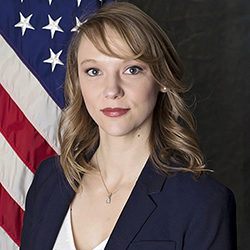 |
| Kerianne L. Hobbs |
What is your next adventure?
I will remain where I am now. For the last nine years, I've worked at Air Force Research Lab (AFRL) in Dayton, Ohio, where I am currently a research aerospace engineer on the Autonomy Capability Team (ACT3). I am looking at whether we can use run time assurance to bound autonomy -- that's a way of monitoring an autonomous learning controller while it's in operation. We think of that as sort of a 'leash' for an autonomous system -- a way you can let it run but no so far that it will get into trouble.
What about your next adventure are you most looking forward to?
I think there's a lot of freedom in my research, room to continue down the path I started during my PhD program and answer interesting questions. Working with Dr. Feron, I had a great mentor who helped me really explore my research interests. At AFRL, my group's goal is to operationalize AI [artificial intelligence] and I've never really done anything with AI and machine learning. I'm excited about what I'll learn.
Did you have any previous co-op, internship, or research experience in this area?
I am a non-traditional PhD student, because I am still working for the AFRL and was only in residence at Tech for one year, 2017. I came to Georgia Tech because my research interests were at the intersection of aerospace, computer science, systems engineering, and psychology. I wanted to better be able to contribute in my cross-domain research area and I knew that Dr. Feron was not afraid to jump across different disciplines to get answers. What I learned from him and from Dr. Lightsey was how to create your own research project at the doctoral level, rather than having a well-formulated problem handed to you. The biggest thing I took away from them was to always go back to first-principles. Have a fundamental understanding of every assumption that goes into an equation. Where does that equation come from and what are its impacts? I approached my work in a much more rigorous way as a result.
How did your educational experience at Georgia Tech help you to achieve your goals?
I had great advisors and mentors. Dr. Feron understood that I came with a breadth of experience and that I was going to use that experience and my research to more thoroughly understand my dissertation topic. He had a way of not answering my questions, but asking a lot of questions in return - I needed to find the answer. He helped me to craft a research topic that I was passionate about, one that I'm continuing today in my career.
What advice would you give to an underclassman who would like to follow the same path?
There are many ways to achieve a goal and never forget your passion for aerospace, especially when preparing for your qualifying exams. My path to the PhD wasn't traditional. But most paths are not linear. If you have a goal and obstacles in your path seem insurmountable, remember there are many ways to your goals. Don't get in your own way with excuses.
For me, the quals started out seeming like insurmountable barriers. I thought for certain they would prove that I did not deserve to be at Tech. You'll have to be the smartest version of yourself that you'll ever be when you take quals. Studying becomes a lot easier if you remember that curiosity, that enthusiasm that got you into research to begin with. Remember how thrilling it is to learn. I found different paths to study for quals from 500 miles away. I joined virtual study groups with other doctoral students and I studied every weekend, no matter what, from January until August. At work, I found opportunities to give talks on topics that were covered in the quals. I knew some of the people at those talks were experts in these subjects and could give me feedback that would help me. Plus, the fear of making a fool of myself in front of PhDs was a good simulation of quals. Choose love of your work in spite of a fear of failing and find your way there.
Emily V. Hale, B.S. AE '20
What is your next adventure?
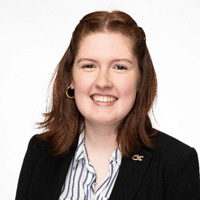 |
| Emily V. Hale |
I'm going to begin a two-year rotational assignment with Raytheon Technologies, as a part of their Margaret Ingels Engineering Development Program. I don't have a location, yet, but I'm excited about the options that I'll have. The original plan was to be in a new city, but, I may need to start remotely, doing my work from the very same desk where I am now studying for classes.
What about your next adventure are you most looking forward to?
I very much enjoyed the interview process for the position at Raytheon, because they really expected you to speak up and identify your strengths. Now, I am even more excited about the development opportunities that are ahead. Over the next two years, I will be put in four different roles, each of them in completely different business units, so I'll get a much wider view of the aerospace industry. Once I was selected, too, I got a call from Professor [J. P.] Clarke, who has been working as a vice president there. He wanted to speak with all of us [Ingels fellows] about our career paths, and our futures. Getting to talk with someone so senior in the field, to get advice from them, is really exciting. I know that the company has an employee scholar program, which could pay for my master's.
Did you have any previous co-op, internship, or research experience in this area?
For two years I was involved in a wide range of research activities in the Experimental Aerodynamics Group with Professor Komerath. We did lots of different projects that involved the wind tunnel. I also contributed to a paper, helping with the editing. That introduced me to a very different aspect of the field. My entire fourth year was spent in the UK at Airbus, where I was an air worthiness intern. My job was to make sure things were certified by the Air Worthiness Authorities. It required broad technical understanding of the system so that I could communicate accurately with the chief engineer, the stress experts, and the design team on changes that were indicated. My team was one of the last steps in the review process. We had to check the regulations, and make sure all of the experts had signed off.
How did your educational experience at Georgia Tech help you to achieve your goals?
More than just a knowledge of aerospace engineering, what I've gained from my time at Tech is that, if you really want to understand a subject, you need to be willing to ask lots of questions. And to do that, you need to work well with a lot of different people, so you need to adapt your approach to fit the situation you are in. So, recognizing this, I've had some great experiences at Tech -- from mentoring first-year students to being on the committee that interviewed the incoming Chair of the AE School.
What advice would you give to an underclassman who would like to follow the same path?
My advice is to give whatever you are doing 100 percent of your attention and energy. What you choose doesn't matter as much as having the ability to give 100 percent. If that's a Design-Build-Fly competition or a Robojacket competition, great.
For me, outside of classes, my goal was to improve the campus's handling of mental health issues. The thing I'm really proud about is real but not tangible: Georgia Tech is a different place, now, when it comes to mental health. The first year I was here, no one spoke about it except a small group of activists.
But if you look at some of the messaging that's been coming out since COVID-19 hit, you'll see a consistent part of the conversation has been mental health. That's a success that matters. This has been a time when a lot of us have really struggled because you have a pandemic that has an unknown end that's making lots of unknown changes to the future. And we've been told to isolate, so we don't go home to our friends.
What we've learned to tell ourselves is to be the best version of ourselves, every day, and to do what we can to have more capacity the next day. I've learned to do the best I can every day, and to not ask myself to do more than that. And what makes me see progress is the number of people who've thought to tell me, during this COVID shutdown: 'I'm here for you. We're here for each other.' That tells me we're making progress.
Oscar Klempay, B.S. AE '20
What is your next adventure?
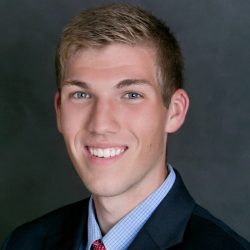 |
| Oscar Klempay |
This summer, I have an internship with SpaceX in Texas and it's still on. I'll be doing stage testing for the Falcon 9. It's an opportunity that I negotiated through the Georgia Tech Mentor Jackets program - an AE grad is head of the program. Then, at the end of the summer I'll return to Tech with a GRA [graduate research assistantship] with the GTRI Air National Guard Program in flight test engineering. I should be graduating with my master's by May of 2021 and, from there, as a member of the Air Force ROTC, I will start pilot training in Shepherd Air Force Base in Texas in the European NATO Joint Jet Pilot Training program - that's a premier school for fighters and bombers.
What about your next adventure are you most looking forward to?
That's hard to choose. I thinking getting to broaden my engineering experience of the planes I'll be flying - F-15s and F-16s - by working on sensor suites for them will be great.
Did you have any previous co-op, internship, or research experience in this area?
That has been quite a journey. I started doing research in the Ben T. Zinn Combustion Lab sophomore year. I really didn't know what research was but I did know, at the time, that I was going around telling everyone who'd listen that I wanted to become an astronaut. I knew that rockets blow up, and that that involved combustion, so I listened to everything they said. I worked there for my sophomore and junior years, learning by doing. The summer before my senior year, I got an internship at NASA Ames, working on the Orion heat shield. My principle job was squishing the 'bugs' that their computer program kept running into. It was a great internship, and I learned a lot, but, just before I went, I had made the decision that computational fluid dynamics was not what I wanted to be doing long-term. That spring, I had started helping Professor Saleh write a textbook on aircraft performance. My work with him and our conversations has convinced me that I would be happier doing vehicle performance flight testing. So when I returned from the internship, I worked with Professor German, doing take-off models for electric aircraft and I started working with GTRI in their Advanced Warfighter Technology Division.
How did your educational experience at Georgia Tech help you to achieve your goals?
Probably the best thing about studying here is that the faculty does not try to make it easy for you. It's not about learning some equation so you can regurgitate it on a test. You are expected to go beyond knowing facts to acquiring knowledge that you can use under demanding circumstances. When the faculty slings challenges at you, they want to see how you'll react, to see if you can pull out what you know to succeed.
Outside of the classroom, Tech's ROTC program - whether you are in the Army, Navy, or Air Force -- gives you great opportunities to grow your leadership skills. They do this by giving you a lot of responsibility, by expecting the most while you are working the hardest.
What advice would you give to an underclassman who would like to follow the same path?
One of the biggest things I've learned at Tech is to never, never, never never give up. Always put forth your best effort and something will work out. I am an example of why.
My junior year, I applied to at least 100 internships and got just six interviews. It was coming to the end of the year, and I still didn't know where or if I'd be working. But I didn't give up. I kept looking for internships - March, April, even into May. It was just around finals when I got a call from a NASA recruiter I'd met at the Fall Career Fair. Someone else had fallen through, and he'd remembered me.
There's a quote that I try to live by, and it's from David Goggin: 'Get comfortable with being uncomfortable.' And every semester I've tried to pick something outside my comfort zone to live up to that goal. Whether it was ballroom dancing, flying with the Yellow Jackets Flying Club, tutoring students in calculus... something that you start out saying 'no way I can do this.' When you end up doing it, it's the best feeling in the world
Brooke N. Weber, B.S. AE '20
What is your next adventure?
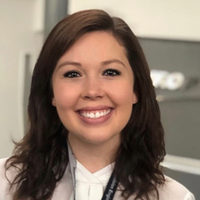 |
| Brooke N. Weber |
I am moving to Florida in June to take a job at Boeing Defense and Space as a mechanical design engineer for the Exploration Upper Stage of the SLS [Space Launch System]. My family and I will be watching the virtual graduation online, but we're also planning to attend when the Institute hosts a live commencement ceremony later on. My parents, my grandparents, everyone. I'll be back.
What about your next adventure are you most looking forward to?
I'm excited to learn so many new things at my job. I'm from upstate New York and so the only places I've lived are there and in Atlanta. Florida, where I don't know anyone, will be a new experience. I'm looking forward to making new friends and to living near the beach. And I'm excited because I'm blessed to have a job that isn't delayed, that's starting on time.
Did you have any previous co-op, internship, or research experience in this area?
I started doing research the summer after my sophomore year when I worked in the ASDL learning Python for integrating API [application programing interface] into the algorithms they were working on. The fact that I had already learned Python made a big difference the next summer when I applied for a propulsion engineering internship for the Launch Vehicle Division of Northrop Grumman in Arizona. That internship taught me so much about the workforce that you can only gain through working in the field. This semester, I have been finishing up research I'm doing with Dr. Saleh writing a paper on regression analysis for helicopter design.
How did your educational experience at Georgia Tech help you to achieve your goals?
Tech honestly taught me more than anything to work hard. You can't expect to do well if you don't work hard. And you'll learn more if you put everything into it. That approach really helped on my internship. After working one summer for Northrop Grumman, I got a return offer, to go back for a job because I had learned how to give it my all.
Tech also taught me to gain depth, not just good grades. There are a lot of people who can get good grades, but Tech demands that you put your grades to work, semester after semester.
What advice would you give to an underclassman who would like to follow the same path?
Everyone's experience is different, but the overarching truth, no matter who you are, is to dip your toes into as many things as you can...without going overboard. You want to balance your involvement so that you can give everything you do enough time.
Another thing I'd say is to try to become an expert in something that makes you stand out. For me, that was two things. One, was learning how to code in languages other than the ones they teach you in class. The second thing is, do something outside your major to improve your soft skills, your communication. I worked as a FASET leader, introducing students to campus, and I joined the Georgia Tech dance team, whenever my semester studies gave me the time. I also joined a sorority - Phi Mu - that gave me a social life, a community away from classes. All of those things helped me develop team skills, which you have to have in the workplace.
Nelson "Giovanny" Guecha-Ahumada, M.S. AE '20
What is your next adventure?
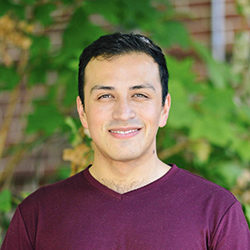 |
|
Nelson "Giovanny" |
I will be working at NASA as an intern on the aerodynamic decelerator, a new area for me, and in the fall, I will join Professor Marilyn Smith's research group, where I will be pursuing my Ph.D. We are still working out the details, but I will be mentored by NASA and advised by Dr. Smith.
What about your next adventure are you most looking forward to?
I feel like I'm very fortunate. I will be able to explore research at Georgia Tech and then I’ll be able to pursue it further in simulations, in wind tunnels...in short, I'll be able to apply my knowledge and make things happen beyond the academy. And then, because NASA has a great platform for outreach, I'm interested in helping others to pursue their interest in engineering.
Did you have any previous co-op, internship, or research experience in this area?
As an undergraduate at Tech, I spent most of my summers taking classes because, as a transfer student, I had more to make up. I used one of those summers to study abroad in Russia, and to learn that language. As an undergrad, though, I got a breadth of experience in the SSDL working on Prox-1 and the early stages of the T.A.R.G.I.T. mission [CubeSats]. I jumped between structures and systems engineering to get a broad take on the field.
In graduate school, I joined Dr. Lightsey's group and worked on Attitude, Estimation, and Control. Most recently, I was developing algorithms for another CubeSat mission, GT-1.
As far as internships, before I got my U.S. citizenship, I started with Emergent Space Technologies, where I was learning about software-in-the-loop. After I got my citizenship, I got a summer internship at NASA Langley, where I did simulation work on entry, descent, and landing - EDL. That was last summer, and, as I had hoped, they liked what I brought, so, this semester, I worked remotely for them while taking my final class online at Tech.
How did your educational experience at Georgia Tech help you to achieve your goals?
The thing that's made a difference at Tech has been the 'go-for-it' mentality. I've been encouraged to try a variety of technologies and approaches, to see what's right for me. Dr. Gunter gave me the opportunity to lead the T.A.R.G.I.T. mission for one semester, so I got a taste of leadership. trying new things - especially the ones that scared me - made me a better candidate for NASA. They liked the fact that I try things. Getting a high GPA was good, but it only takes you so far. At Tech I was encouraged to learn a new language, to take leadership coaching classes to develop my soft skills.
Also, Georgia Tech has expanded my world view. I could walk into the student center or even into a class and talk with people from all over the world. The diversity of our students, and our faculty, it makes a difference.
What advice would you give to an underclassman who would like to follow the same path?
My advice is very simple: believe in yourself.
When things got tough, it was always a matter of believing 'I can do it.' I kept telling myself that it was going to work. And just telling myself this gave me more control over the doubts I had. It's very easy, at Georgia Tech, to feel you are an imposter. There are so many smart people here. But you have to remember that you did everything to make yourself good enough to get in, you are good enough to stay.
Edwin Goh, Ph.D. AE '20
What is your next adventure?
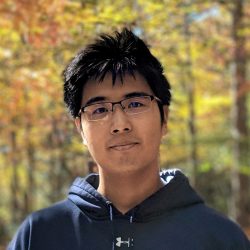 |
| Edwin Goh |
Well, I was actually able to start my next chapter before I got my Ph.D. I am currently working at JPL as a data science engineer. I defended in late January and moved out here. I just got all of my [dissertation] edits approved the other night at around midnight - sent a photocopy of the paperwork to my parents in Malaysia. At JPL, I am working on the software side of things... actually last week, we started working on a project related to COVID 19 where we're trying to use NASA's satellites to predict the long-term effects of COVID 19 on society, the environment, and the economy. It's really cool, and it's not like I didn't like combustion -my domain knowledge in aerospace engineering is really helpful -- but data science felt like the right place.
What about your next adventure are you most looking forward to?
I really like JPL. It has a very campus-like atmosphere and, now, I get to choose my own topics, find my own experts in different areas like Europa and robotics, and join in on different problems. The world is really my oyster. And, now that I'm done with my dissertation, I don't have to work on my edits when I'm done with work for the day.
Did you have any previous co-op, internship, or research experience in this area?
As a freshman, I got involved in some research with Dr. Mavris on rechargeable micro-vehicles. To be honest, I didn't contribute much to that project but it got me interested in doing undergrad research. I looked for research every year after that. My next research project was with Dr. Holzinger on the RECONZO [CubeSat] mission and on space situational awareness -- really, that's space debris. And, from that, I can say that jumping into research is important not only to find out what you want to do, but to find out what you don't want to do. With space debris, there are problems with orbital mechanics and math that are way more hairy than anything I wanted to do, so after that project I went to Dr. Jagoda to get some idea of what else I could do. He put me in touch with Dr. Seitzman and the Combustion Lab, where they were doing an FAA project on ignition testing of alternative jet fuel. I started out on the experimental end of that project but I also go involved in a parallel area that involved computational simulation. That's where I started getting into data science. And I always think it's kind of funny that I ended up being the only doctoral student Dr. Seitzman ever had who never did an experiment. Not as a doctoral student anyway.
Internships were another story. As an undergraduate, I was not that motivated to put myself out there to compete when a lot of companies didn't want foreign nationals involved in aerospace research. But, with one year left on my Ph.D., I ran out of funding on my FAA project, so I started looking around for an internship that would pay me to finish. This was a pivot point in my time at Georgia Tech. There was a manager at UPS [United Parcel Service] who was looking for a data scientist intern to do advanced analytics for their group. They were trying to bring big data into their operations, someone who could jump into high-performance computing. They really like my problem-solving abilities, how, as an engineer, I focused on how to get things done efficiently. I can honestly say that I learned about AI and machine learning to prepare for that internship.
That internship got me started in a new direction so that, when it was time to graduate, and I saw a data scientist job at JPL, I decided to apply for it. But I didn't just apply. I figured out the hiring manager's email address and I sent him a letter. I didn't get a response, so I sent another. I also figured out his Twitter account and his Linked-in account and sent him notes. Finally, after I sent him the third email, he called me and suggested me have a phone interview. Even though I'd been pushing for this, I was afraid. I didn't have the educational pedigree that other applicants would. So my advisor, Dr. Seitzman, encouraged me to sell my skills, to show them that I was capable of doing as much, if not more, than someone with a data science degree. Still, I wasn't actually thinking I'd get it - there are so many others with more training in that field. But in the end, they liked the fact that, as a Georgia Tech Aerospace Engineering School grad, I had domain knowledge in aerospace as well as data science. The combination was what sold them.
How did your educational experience at Georgia Tech help you to achieve your goals?
The breadth of the course work helps a lot -- not only because of the domain knowledge they impart, but because of the way they teach you to attack problems. On a par with that is the faculty, who are like an interconnected web of resources and advice that works together to make you succeed. Dr. Seitzman didn't just help me prepare for JPL, he was there guiding me in life decisions all along the way. And if it weren't for Dr. Jagoda recommending me for a project with Dr. Seitzman, I would not have made that connection.
What advice would you give to an underclassman who would like to follow the same path?
Well, I've been practicing this already, since I have a sister who is a second-year in [the Georgia Tech School of] Mechanical Engineering. The first thing I told her was something I wish I'd done sooner: get a job on campus. In my case, I worked in the AE School mailroom, with Howard [Simpson] and I can tell you now, I found Howard way too late. An on-campus job gives you a great release from all of the pressures of classes, tests, and studying. It wasn't just a source of income; it was a connection to the AE community. I met professors coming into the mailroom all the time. Dr. Schrage actually hired me to TA one of his classes when I was in between funding.
The second thing I'd say is: get an internship. I know as a foreign national it was hard, but it was not impossible. For me, the internship was eye-opening. I saw an entirely different way of looking at the world, and I learned how to dress and how to act in it. I also built connections.
Taylor Fazzini, M.S. AE '20
What is your next adventure?
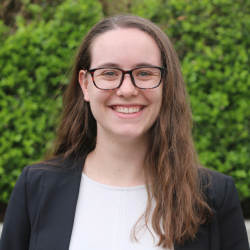 |
| Taylor Fazzini |
In June, I will be starting full-time as a systems engineer with Northrop Grumman in their Future Technical Leaders program, a three-year rotational that will give me a chance to try different jobs in different parts of the company. The thing is, now, I don't know where I will start. I just know that, the first year, anyway, they try to put you somewhere outside your specialty.
What about your next adventure are you most looking forward to?
One of the things that's really great is that I get to live in three different cities: one year in Chicago, one year in San Diego, and one year in D.C. I'm really excited to be able to explore the different business units - things like contracting and planning, for instance. I will really be able to develop different people skills.
Did you have any previous co-op, internship, or research experience in this area?
As an undergrad, at Embry Riddle, I did five rotations at Gulfstream. That's where I met a lot of Georgia Tech students, who were also there on internships. My last one was in preliminary design and supersonics, and it gave me CFD experience that really stood out when I came to Tech for my master's. In fact, I remember during orientation day, when Dr. Tai was were telling all of the grad students to check out different projects, to see what they liked, he added "Except for two of you..." I was one of the students he pulled aside for a project with the Ascent 10, an FAA project that needed CFD and supersonic experience. It was a perfect fit. We've worked on three different aircraft doing aerodynamic analysis and developing tools they didn't have.
How did your educational experience at Georgia Tech help you to achieve your goals?
Working in the ASDL has done more than I ever thought possible to broaden my knowledge of the discipline. ASDL's approach of introducing us to systems engineering -- high-level designs - taught me how to not just adapt but to thrive outside my comfort zone. I worked on things I never thought I would do, like an unmanned aircraft with active flow control. Dr. Glazer's done a lot of work on that, but now I get to work on it, too. And ISR - [intel, surveillance, & reconnaissance], where you analyze how the military command operations use UAVs and satellites. Now that I am going into Northrop Grumman's Future Technical Leader program, I will have a better grasp on how to adjust to new challenges.
What advice would you give to an underclassman who would like to follow the same path?
I would definitely recommend you get involved in a professional organization - like AIAA [American Institute of Aeronautics and Astronautics], which is what I did. It's a great network-builder, which is something every engineering student needs to do at some point. The organizations give you a chance to present research and to meet others who are doing the same work. Even if you are not presenting, go so that you can keep up with your peers. These are people who will be career-long connections and even leads for jobs in the future. This was incredibly helpful for me, because I didn't know anyone at Georgia Tech when I got here, but I had met some at conferences.
Sanjana Tewathia, B.S. AE '20
What is your next adventure?
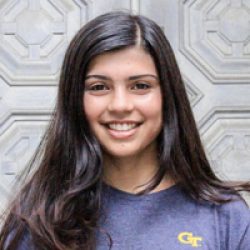 |
|
Sanjana Tewathia |
Right now, I am still on target for doing an internship at Ball Aerospace in Colorado. It's part of the Brooke Owens Fellowship, and, right now, though I am in Princeton, New Jersey, I plan to move out to Colorado in June to start that. After the summer, I will be pursuing my master's degree at the University of Colorado, Boulder. I'll be focusing on autonomous systems.
What about your next adventure are you most looking forward to?
I am really excited to be going to Colorado. I love the city of Atlanta, but I also love the outdoors and Colorado is a beautiful state. I also think Colorado is a great hub for the industry, so I'm excited about building my network there.
Did you have any previous co-op, internship, or research experience in this area?
In the summer after my freshman year, in 2017, I started working in the Space Systems Design Lab (SSDL) where I worked on the T.A.R.G.I.T mission. I've been there for the last 3 years working on different subteams to get a variety of experience, and it's been great. I've worked on the mechanical design group, the computing team. And I've helped to develop] software and electronics for the satellite. Because we have the Maker Space and the Machine Shop in the AE School, we've been able to make components, which is also amazing.
In the fall of my sophomore year, I did an internship at GE Aviation in Cincinnati, Ohio. I was on the support and diagnostic teams, running alerts for two engines the GE90 and the GP7200. I loved my team and the company was great.
This summer, I will be a Brooke Owens Fellow, working at Ball Aerospace.
How did your educational experience at Georgia Tech help you to achieve your goals?
I think the AE options courses helped me to learn my subject matter in more depth. They gave me a competitive interdisciplinary skill set, exposure to the full breadth of the discipline, and allowed me to pursue a computer science minor, which I loved doing. The extra-curriculars, like my involvement in Sigma Gamma Tau, strengthened my mentoring and organizing skills. I have been a teaching assistant for the College of Computing and I wanted to start the same thing in AE, where we would have undergraduate teaching assistant. We were able to start that, and it's only going to get better. With the Women of Aeronautics and Astronautics (WoAA), I was able to do a training workshop in the AE Machine Shop, run for and by women. It was so great to see more women using the equipment.
What advice would you give to an underclassman who would like to follow the same path?
In addition to classes, pick up something on the outside - like the Aero Maker Space or a student organization -so you can get some hands-on experience. It's helpful for showing companies a list of skills that you developed in a research lab or in a maker space, where you applied what you learned.
The second thing is, find an AE support group - sooner than later. For me, it wasn't until I did the AE Study Abroad program in Limerick [Ireland] that I learned how to become that person who pulls together the class 'GroupMe' app. We all have questions before tests, so it made sense that we connect. You want to know who you can work with, because you will be working with your classmates. By your third year, you are going to know everyone anyway. It makes sense to connect before then.
Another thing: 'Don't be afraid to figure out what you like and don't like. And change, if it makes sense.' There is so much pressure at Tech to get things 'right' - to find the right internship, the right job, the right research position. But your first job after you leave Tech won't be your last one, so it's better to get comfortable with changing your experience. You might start your career in a huge company but maybe you really want to be in a small start-up. Get good at listening for the cues.
And maybe the number one thing is: know your options for taking courses while you are at Tech. A lot of us get that flow chart our freshman year and we don't look at it again for a while. But the thing is, your time goes by so quickly, and you have to meet certain requirements. You don't want to look back at your time and think, 'Oh, I would love to have taken that course or earned a minor in that subject.'
Romaine D. Coley, B.S. AE '20
What is your next adventure?
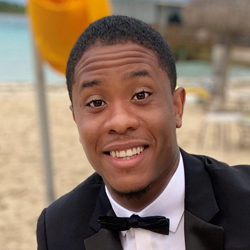 |
|
Romaine D. Coley |
The pandemic has thrown a lot of plans out the window, but not all. I have just passed the Google Cloud Certification so I am hoping to work for Google when the pandemic lets up and things open again. After that, I will pursue a graduate degree that focuses on machine learning.
What about your next adventure are you most looking forward to?
Education has been a long journey - 15 years, really, of studying and working hard, so I am looking forward to applying what I've worked to master. To see something tangible after all of these years will be something exciting. It will also be nice to be able to pay off my student loans. More immediately, my parents flew here from Jamaica and have been stranded here because of the pandemic. So we'll be celebrating, certainly.
Did you have any previous co-op, internship, or research experience in this area?
As a transfer student and as a non-resident -- I'm from Jamaica -- I anticipated from the beginning that there wouldn't be many opportunities for me to do an internship during the two-and-a-half years I've been at Tech. Aerospace engineering as a field is pretty lock-down in terms of citizenship. But I went to the Career Fairs and I went on interviews and had a few callbacks. It was worth it, to see how many companies and options are out there. And I had a lot of classes to take. I came to Tech because I wanted to build planes, and, in my senior year, I was on a team for the Boeing AerosPACE project where we built a UAV from scratch. And it flew. I was the control systems leader on the team, where we remotely worked with students from Purdue and Iowa State.
The area where I'd really like to do research - machine learning - I didn't really know about until my final two semesters, when I took a class with Professor Theodorou.
How did your educational experience at Georgia Tech help you to achieve your goals?
At Tech, I learned not just how to pass a test, but how to really understand the material. Because you'll have to come back to it at some point, and you want to have something to draw on.
This lesson got driven home during one of my first semesters at Tech, when I took System Design and Vibration with Professor Haddad. It's a hard class and one that every aerospace engineer has to take. I had not done modeling for a few years, so I was struggling. In fact, my first test, I absolutely failed. I had always been a straight-A student, and I was determined to not fail. But the only time I could make it to office hours was after I finished work, when most people were gone. I approached Dr. Haddad and told him, straight out; 'If you are willing to work with me, I'll do all of the work it takes to pass this class, to really understand the material.'
He said he was willing. And he was. He'd meet with me for an hour or more after everyone was gone, and I'd go study on my own for hours, filling up notebooks. The next test, I didn't just pass, I broke the curve.
What Dr. Haddad showed me was what it takes to succeed at being an aerospace engineer. It's not just a lot of work. It's a lot of effort. And he was willing to put that effort toward me.
What advice would you give to an underclassman who would like to follow the same path?
Well, most students start out trying to register for classes that don't meet at 8 a.m., and that's not the way to go. I took a lot of the harder AE classes so I could get them out of the way, leaving the AE options classes for the end. I wish I'd paid more attention to those options classes earlier on. They are classes that can introduce you to a subject that could change your direction. When I came to Tech, I had expected that I would master CFD and machine learning, but I had no idea that I'd find them both so interesting. It was by taking a machine learning class during my final semester that I found something that really fit me. It's what I want to continue learning.
Melody Marshall, B.S. AE '20
What is your next adventure?
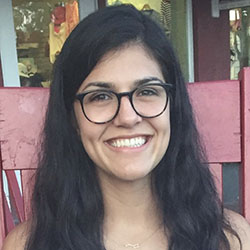 |
|
Melody Marshall |
I will be commissioned in the Air Force Reserves as a second lieutenant, - specifically, a space operations officer. When I report to training, it will be as a second lieutenant in the U.S. Space Force.
What about your next adventure are you most looking forward to?
I am so excited to be entering the Space Force, as one of the first officers. I've always thought it was important for the United States to focus on space and I am so grateful that I now have the skills to contribute to it. It's especially exciting for me because I started out at Tech as a biomedical engineering major and I switched majors (and joined the ROTC) at the end of my first year. It was a big jump, but I found myself more interested in physics than chemistry, and all of the AE students I met seemed to be headed in the same direction. It was a great choice.
Did you have any previous co-op, internship, or research experience in this area?
As an ROTC student, I wasn't able to leave campus for internships, but I did get some great research experience this past semester at GTRI with the Aerospace Transportation Advanced Systems (ATAS) lab where I worked on small unmanned aerial systems [UAS]. It was a lot of systems engineering research. I was looking up information about UASs - finding what analysis tools would work best to determine their capacity, their performance. And it was eye-opening.
Also, it wasn't formal research, but when I found out I was joining the Space Force, I took two AE Options classes with Professor Lightsey that gave me an introduction to research. In one of them we were doing research to create a preliminary mission plan for a NASA mission to Europa. I also took one on space flight operations.
How did your educational experience at Georgia Tech help you to achieve your goals?
At Tech, everything fell into place - transferring to the AE major, great professors, joining ROTC - but it wouldn't have all fallen together if there hadn't been so many opportunities for me to take. Once I got into AE, I was able to explore everything - fixed wing, rotorcraft, and space. Once I took Vehicle Performance, which only briefly touches on space, I knew that's where I wanted to go. By the time I took classes with Dr. Lightsey, I knew that I was going into the Space Force for my career, but, maybe because he's a great passionate professor, I was just fascinated by it all. I loved going to class.
What advice would you give to an underclassman who would like to follow the same path?
I would say don't be discouraged by your failures. Georgia Tech is a very hard place, where you are bound to stumble a little. Instead of looking down at your failures, I'd say look up to see what you can take advantage of. Be inspired by what's around you.
I'd also say stick to what you think makes sense. When I decided to join the ROTC, it was when I was transitioning into the AE School. A lot of people questioned this decision - no one in my family had gone into the military - but I could see that a lot of the jobs in aerospace were associated with the Department of Defense. It was the perfect fit for me.